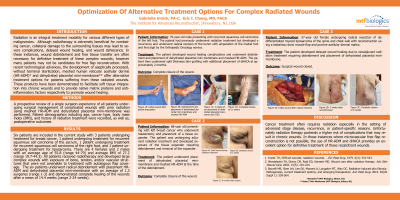Case Series/Study
(CS-037) Optimization of alternative treatment options for complex radiated wounds
Thursday, May 16, 2024
7:30 PM - 8:30 PM East Coast USA Time

Introduction: Radiation is an integral treatment modality for various different types of malignancies. Although radiotherapy is extremely beneficial for combating cancer, collateral damage to the surrounding tissues may lead to severe complications, delayed wound healing, and wound dehiscence. In these instances, wound debridement and free tissue transfer are often necessary for definitive treatment of these complex wounds; however many patients may not be candidates for free flap reconstruction. With recent technological advances, the development of aseptically processed meshed human reticular acellular dermis (HR-ADM) without terminal sterilization and dehydrated human amnion and chorion (dHACA) offer alternative treatment options for patients suffering from these radiated wounds. These products have been demonstrated to facilitate soft tissue integration into chronic wounds and to provide native matrix proteins and anti-inflammatory factors respectively to promote wound healing.
Methods: A prospective review of a single surgeon experience of all patients undergoing surgical management of complicated wounds with prior radiation using meshed HR-ADM and dHACA was performed. Patient demographics including age, cancer type, body mass index (BMI), and history of radiation treatment were recorded, as well as, postoperative outcomes.
Results: Six patients are included in the current study with 3 patients undergoing treatment for breast cancer, 1 patient undergoing treatment for recurrent squamous cell carcinoma of the sacrum, 1 patient undergoing treatment for recurrent squamous cell carcinoma of the right foot, and 1 patient undergoing treatment for liposarcoma. There are 4 females and 2 males with an average age of 55.8 (range 44-79) and average BMI of 27.2 (range 19.7-44.3). All patients received radiotherapy and developed large complex wounds with exposure of bone, tendon, and/or vascular structures that were not amenable to treatment with autologous flap coverage. The six patients underwent radical debridement with placement HR-ADM and dHACA with an average of 1.3 surgeries (range 1-3) and demonstrated complete healing of the wounds after a mean of 14.4 weeks (range 2-24 weeks).
Discussion: Cancer treatment often requires radiation especially in the setting of advanced stage disease, recurrence, or patient-specific reasons. Unfortunately radiation therapy portends a higher risk of complications that may result in chronic wounds. In those instances where microvascular free flap reconstruction is not possible, the use of HR-ADM and dHACA provides an excellent option for definitive treatment of these recalcitrant wounds.
Methods: A prospective review of a single surgeon experience of all patients undergoing surgical management of complicated wounds with prior radiation using meshed HR-ADM and dHACA was performed. Patient demographics including age, cancer type, body mass index (BMI), and history of radiation treatment were recorded, as well as, postoperative outcomes.
Results: Six patients are included in the current study with 3 patients undergoing treatment for breast cancer, 1 patient undergoing treatment for recurrent squamous cell carcinoma of the sacrum, 1 patient undergoing treatment for recurrent squamous cell carcinoma of the right foot, and 1 patient undergoing treatment for liposarcoma. There are 4 females and 2 males with an average age of 55.8 (range 44-79) and average BMI of 27.2 (range 19.7-44.3). All patients received radiotherapy and developed large complex wounds with exposure of bone, tendon, and/or vascular structures that were not amenable to treatment with autologous flap coverage. The six patients underwent radical debridement with placement HR-ADM and dHACA with an average of 1.3 surgeries (range 1-3) and demonstrated complete healing of the wounds after a mean of 14.4 weeks (range 2-24 weeks).
Discussion: Cancer treatment often requires radiation especially in the setting of advanced stage disease, recurrence, or patient-specific reasons. Unfortunately radiation therapy portends a higher risk of complications that may result in chronic wounds. In those instances where microvascular free flap reconstruction is not possible, the use of HR-ADM and dHACA provides an excellent option for definitive treatment of these recalcitrant wounds.

.jpeg)